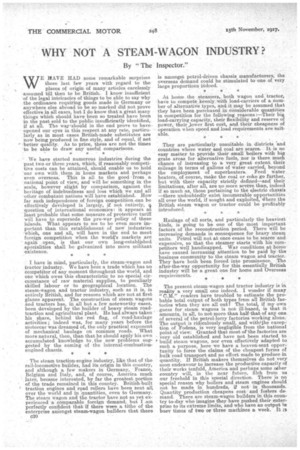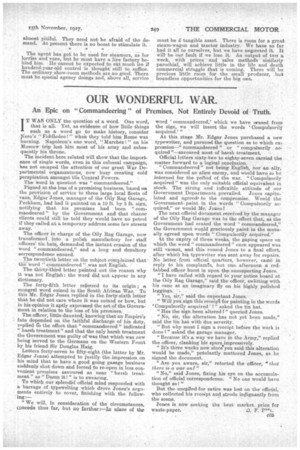WHY NOT A STEAM-WAGON INDUSTRY?
Page 4

Page 5

If you've noticed an error in this article please click here to report it so we can fix it.
By "The Inspector."
WE HAVE HAD some remarkable surprises these 'last few years with regard to the. places of origin of many articles carelessly assumed till then to be British. I know insufficient of the legal intricacies of things to be able to say why the ordinance requiring goods made in Germany or anywhere else abroad to be so marked did not prove effective in all cases, but I do know that a great many things which should havebeen so treated have been -in the past sold to the public insufficiently identified, if at all. The wee-should in the end prove to hav,€. opened our eyes in this respect at any rate, particu.larly as in most eases British-made substitutes are now being produced in fine style, and of equal, if not -better quality. As to price, these are not the times to be able to draw any useful comparisons.
• * * *
' We have started numerous industries during the past two or three years, which, if reasonably competitive costs can be attained, should enable us to hold 'our own with them in home markets and perhaps even overseas. This is all to the good -from a national point of view' and will be something in the
scale however slight by comparison, against the _
heritage of indebtedness and loss which we and all -other combatant nations will have established. How far such independence of foreign competition can be effectively developed is largely, if not entirely, qr question of international economics: it appears at least probable that some measure of protective tariff will have to supersede the pre-war policy of these islands. What appears to me to be even more important than this establishment of new industries -which, one and all, will have in the end to meet foreign competition when the world's markets are 'again . open, is that our -own long-established .specialities shall be galvanized into more militant existence.
I have in mind, particularly, the steam-wagon and tractor industry. We have here a trade which has no competitor of any moment throughout the world, and one which owes this characteristic to no special circumstance of raw material supplies, to peculiarly skilled labour or to geographical location. The steam-'wagon and tractor industry, Such as it is, is entirely British, and for reasons which are not at first glance apparent. The construction of steam wagons and tractors has, in all but a few noteworthy cases, been developed by the builder of heavy steam roadtraction and agricultural plant. He had always taken ' his share, behind the red flag, of road-haulage activities ; indeed was, for many years before the Motorcar was dreamed of, the only practical exponent of mechanical haulage on common roads. What more natural, then, than that he should apply his own aceumuIated knowledge to, the new problems suggested by the coming of the internal-combustionengined chassis.
The steam traction-engine industry, like that of the rail-locomotive builder, had its origin in this country, and although a few makers in Germany, France, Belgium and Italy, and, of course, America much later, became interested, by far the greatest portion of the trade remained in this country. British-built traction engines and road rollers have been sent all, over the world and in quantities, even to Germany. The steam wagon and the tractor have not as yet experienced a comparable foreign demand, but I .am perfectly confident that if there were a tithe of the enterprise amongst steam-wagon builders that there 030 is amongst petrol-driven chassis manufacturers, the overseas demand could be stimulated to one of very large proportions indeed. •
• At home the steamers, both wagon and tractor, have to compete keenly with load-carriers of a number of alternative types, and it may be assumed that they have been purchased in-considerable quantities in eompetition for the following reasons :—Their big load-carrying eapaeity, their flexibility and reserve of power, their Jower first cost, and their cheapness of operation when speed and load requirements are suitable.
They are particularly unsuitable in districts and countries where water and coal are scarce. It is no easy matter to provide their small boilers with big grate areas for alternative fuels, nor is there much chance of increasing to a very great extent their mileage in terms of gallons of water carried, beyond the employment of superheaters, reed water heaters, of course, make the coal or coke go further, but with their capacity strictly defined—and their limitations, after all, are no more severe than, indeed if so much as, those pertaining to the electric chassis —there undoubtedly exist innumerable opportunities all over the world, if sought and exploited, vihere the British steam wagon or tractor could be profitably introduced.
Haulage of all sorts, and particularly the heaviest kinds, Is going to be one of the most important factors of the reconstruction period. There will be increasing demands in consequence for heavy steam units. Petrol will not at once cease to be scarce and expensive, so that the steamer starts with his competitors well handicapped. War conditions at home have caused increasing attention to be paid by the business conminnity to the steam wagon and tractor. They have both been forced into prominence. The after-the-war opportunity for this essentially British industry will be a great one for home and Overseas
requirements.
The present steam-wagon and tractor industry is in reality a very small one indeed. I wonder if many " C.M." readers have troubled to estimate the probable total output of both types from all British factories when they are all out? The total, if my own . guess for. steam wagons is not ill-based, is that it amounts, in all, to not more than half' that of any one of several of the petrol-lorry factories working alone. The output is ridiculously small, and withqhe exeeption of Fodens, is very negligible from the national point of view. Granted that most of the factories are very old established and have not been started to 'build steam wagons, nor even effectively adapted to such a purpose, here we have a heaven-sent opportunity to force the claims of the cheapest forms of bulk road transport and no effort made to produce in quantity.. If British makers themselves do not very soon endeavour to increase the productive capacity of their works tenfold, America and perhaps some other country will, in the near future, filch from us our freehold in this special direction. There is no special reason why boilers and steam engines should not be made in hundreds, if not in thousands. Quantity production cheapens cost and fosters de, mend. 'There are steam-wagon builders in this country to-day who imagine they have pushed their enterprise to its extreme limits, and who have an output in busy times af two or three machines a week. It :s almost pitiful. They need not be afraid of the demand. At present there is no boost to stimulate it.
The agent ha a got to be used for steamers as for lorries and vans, but he must have a live faciory behind him. He cannot be expected to cut much ice if hundred-year-old control is thought still to suffice. The ordinary show-room methods are no good. There must be special agency doings and, above all, service must be d tangible asset. There is room for a great ste,am-wagon and tractor industry. We have so far had it all to ourselves, but we have neglected it. It wilt be our fault if we lose it. An output of two a week, with prices and sales methods siniilarly parochial, will achieve little in the life and death commercial struggle that is coming. There will be precious little room for the small producer, but boundless opportunities for the big wee.
























